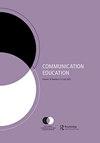大学课堂中的教师真实性:真实教学的交际与行为表达
IF 0.9
Q3 COMMUNICATION
引用次数: 0
摘要
摘要:本研究的目的是检验教师为向学生展示真实自我而制定的自我报告信息和行为。通过对51名大学教师的开放式调查回答进行主题分析,结果表明,教师通过开放和成长心态展示了真实性。此外,出于四个原因,教师们被激励要真实:树立谦逊、建立联系、赋予学生权力,以及将课程理念融入生活。研究中的教师还被问及不真实的沟通,并揭示了他们在这方面的三种行为:战略模糊、不诚实和负面影响的表现。不真实的交流在很大程度上是为了保持专业性,或者因为教练对某个特定主题的真实交流感到不舒服。该分析还揭示了一系列教师与学生进行真实和不真实交流的结果。本文章由计算机程序翻译,如有差异,请以英文原文为准。
Teacher authenticity in the college classroom: communicative and behavioral expressions of authentic instruction
ABSTRACT The purpose of the current investigation is to examine the self-reported messages and behaviors teachers enact to demonstrate their (in)authentic selves to students. Using a thematic analysis of open-ended survey responses from 51 collegiate instructors, results indicate that teachers demonstrate authenticity through openness and a growth mindset. Further, instructors were motivated to be authentic for four reasons: modeling humility, connection, student empowerment, and bringing course concepts to life. Instructors in the study were also asked about inauthentic communication, and revealed three behaviors they enact in this regard: strategic ambiguity, dishonesty, and displays of negative affect. Inauthentic communication was largely employed to maintain professionalism or because the instructor was uncomfortable with authentic communication on a given topic. The analysis also revealed a series of instructor outcomes for both authentic and inauthentic communication with students.
求助全文
通过发布文献求助,成功后即可免费获取论文全文。
去求助
来源期刊

COMMUNICATION EDUCATION
EDUCATION & EDUCATIONAL RESEARCH-
CiteScore
3.10
自引率
34.80%
发文量
47
期刊介绍:
Communication Education is a peer-reviewed publication of the National Communication Association. Communication Education publishes original scholarship that advances understanding of the role of communication in the teaching and learning process in diverse spaces, structures, and interactions, within and outside of academia. Communication Education welcomes scholarship from diverse perspectives and methodologies, including quantitative, qualitative, and critical/textual approaches. All submissions must be methodologically rigorous and theoretically grounded and geared toward advancing knowledge production in communication, teaching, and learning. Scholarship in Communication Education addresses the intersections of communication, teaching, and learning related to topics and contexts that include but are not limited to: • student/teacher relationships • student/teacher characteristics • student/teacher identity construction • student learning outcomes • student engagement • diversity, inclusion, and difference • social justice • instructional technology/social media • the basic communication course • service learning • communication across the curriculum • communication instruction in business and the professions • communication instruction in civic arenas In addition to articles, the journal will publish occasional scholarly exchanges on topics related to communication, teaching, and learning, such as: • Analytic review articles: agenda-setting pieces including examinations of key questions about the field • Forum essays: themed pieces for dialogue or debate on current communication, teaching, and learning issues
 求助内容:
求助内容: 应助结果提醒方式:
应助结果提醒方式:


